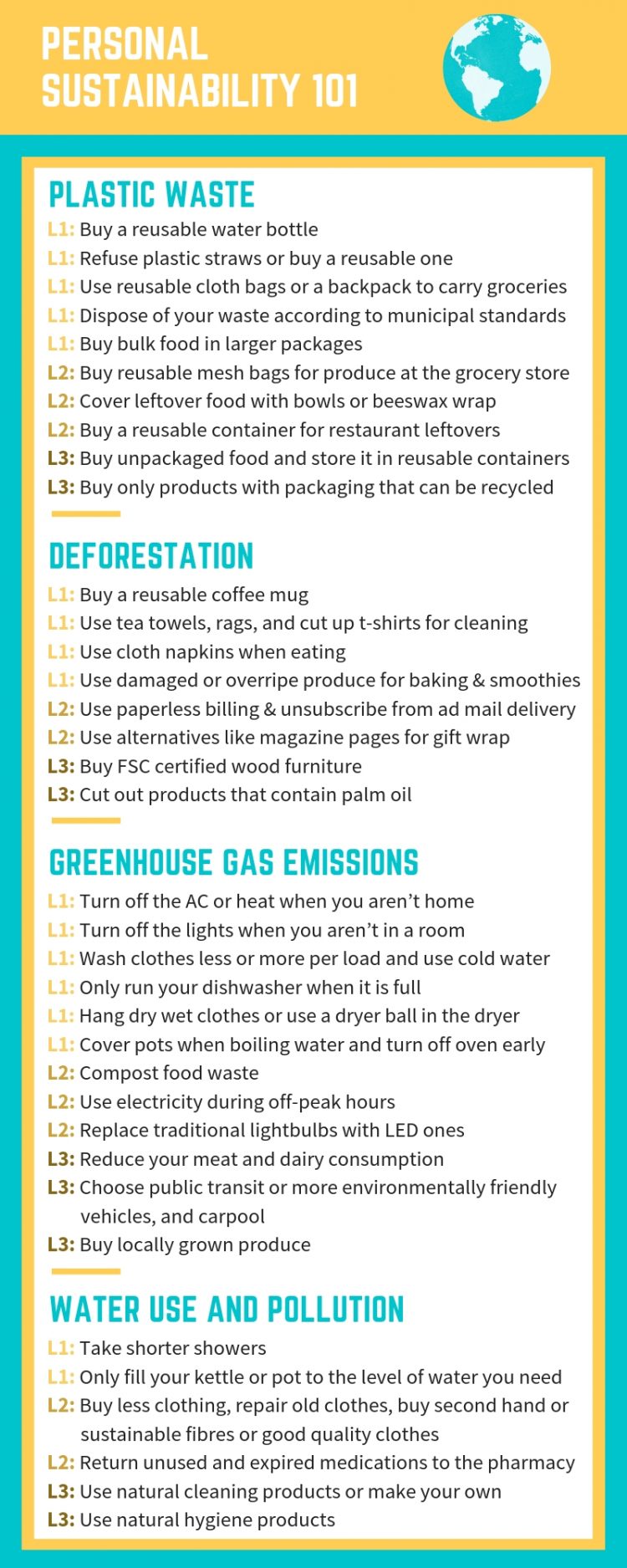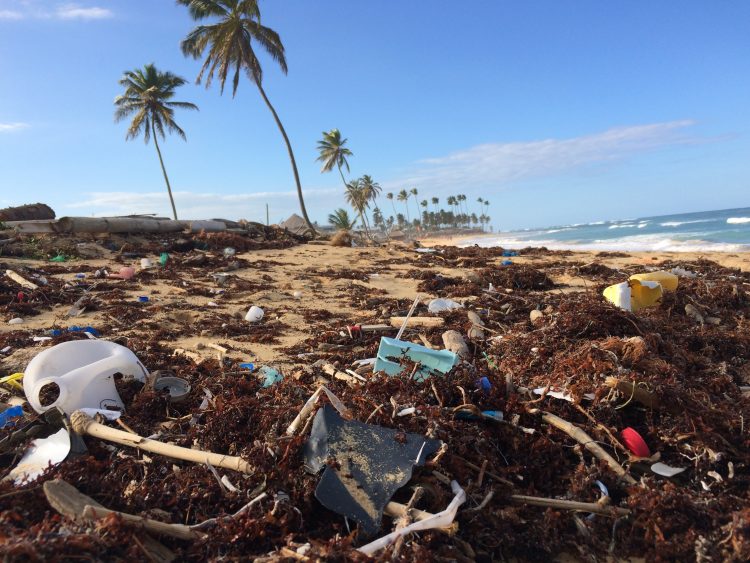Personal Sustainability 101
You don’t just have to work in Social Impact or CSR to feel like you have a purpose. There are many things you can be doing in your daily life to make a difference and have an impact.
Compiled is a list that is both comprehensive and easy to understand. Each activity is categorized as novice, intermediate, or advanced. Don’t feel like you need to do everything all at once, try starting with the novice actions and gradually working your way up to advanced. Even if you only take a couple of the actions that are recommended, you can make a huge positive impact!

PLASTIC WASTE
You’ve probably noticed single-use plastics getting a lot of attention in the media lately. That’s because plastic has some serious environmental impacts. A lot of oil is used to make plastic, and because of our limited recycling capacity, plastic often ends up being dumped into the natural environment, primarily our oceans.

Novice: A few things you can do to reduce your plastic waste…
- Buy a reusable water bottle to use instead of plastic water bottles.
- Refuse plastic straws. If you need them, consider buying a reusable alternative.
- Use reusable cloth bags or even a backpack when buying groceries.
- Check your municipal standards to ensure your waste is being disposed of properly. For example, black plastic and stand-up plastic bags can’t be recycled in a lot of municipalities in Canada and should be put in the garbage.
- If you do need to buy food that has plastic packaging, buy in bulk rather than buying multiple smaller items.
Intermediate: If you want to do more than just that…
- Buy reusable mesh bags for produce instead of using the clear plastic bags they provide at the grocery store.
- Instead of using regular plastic wrap for leftovers, cover your food with bowls or plates. If you still want to use some kind of wrap, try reusable beeswax wrap.
- Similar to using a reusable water bottle, buy a reusable glass food container to use at restaurants to pack up your leftovers.
Advanced: If you’re feeling really ambitious…
- Rather than buying packaged food, consider using glass containers and buying some food in bulk without packaging, like grains, nuts, and seeds.
- If you’re buying products in packaging that can’t be recycled in your municipality, find alternatives that have packaging which can be recycled.
DEFORESTATION
Deforestation is gaining traction in the media recently. Our forests are so important because they house an insane amount of the world’s biodiversity. As well, forests capture massive amounts of carbon dioxide and help slow climate change. So what can you do?
There are definitely some easy ones which you might already do…
- Buy a reusable coffee mug to use instead of paper cups. This is especially important because some paper cups can’t even be recycled (if they are lined with plastic which most are).
- Instead of paper towels, use tea towels for cleaning up in the kitchen and rags or cut-up t-shirts for cleaning up around the house.
- Use washable cloth napkins instead of paper napkins.
- Don’t throw out damaged, overripe, or oddly shaped produce; use it for things like smoothies and baking.
These ones take a bit more work but can be pretty rewarding…
- Sign up for paperless billing when it comes to your banking, hydro, etc. and unsubscribe from junk mail delivery.
- Use magazine pages to wrap gifts instead of regular gift wrap or other sustainable gift wrap options.
Level up with these ones. They actually aren’t too difficult since they just require you to be a more informed consumer and to make smart purchasing decisions based on this information…
- Buy less furniture. Should you really need to though, make sure any wood furniture you buy is FSC certified. This means that new trees are planted in place of harvested trees which can reduce the environmental impact.
- Stop buying food and other products containing palm oil. Palm oil farming leads to significant deforestation. Check out this link for a list of products you can cut out: Products Containing Palm Oil.
GREENHOUSE GAS EMISSIONS
Pay extra attention here because this topic is extremely important. We’ve been talking about climate change for a while now, but we just can’t seem to slow it down. We all need to chip in to prevent serious impacts like flooding, forest fires, and more severe storms. So here is what you can do to help.
These will actually save you money and are super easy…
- Turn off your air conditioning or heater when you aren’t home.
- Turn off the lights when you aren’t in a room.
- Wash your clothes less often. But when you do wash your clothes, put more clothes in each load and use cold water. It’s just as effective.
- Hang dry your clothes instead of putting them in the dryer. This also helps your clothes last longer. If you do need to use the dryer, use a dryer ball. They cut drying time by 25%.
- Only run your dishwasher when it is full.
- Cover your pots when you’re boiling water and turn off the oven for the last few minutes while food is cooking (it will stay hot!).
Getting harder…
- Start composting your food waste instead of putting it in the garbage. For people in houses this means using a green bin, and for apartment and condo dwellers, there is often a compost chute or other disposal method. One handy trick is to keep your compost in the freezer until you’re ready to get rid of it. This prevents leaking and bad odours.
- When possible, use electricity during off-peak hours. This works for running your dishwasher, washing machine, and dryer, and taking showers. Check your electricity provider’s guidelines for schedule details.
- Replace your regular light bulbs with LED ones.
Definitely the hardest, but you don’t have to go all-in right away. Even slight changes with these ones can make a huge difference because of how impactful they are…
- Cut down on your consumption of meat and dairy. In terms of meat, stay away from red meat like beef and lamb.
- Choose public transit instead of driving a vehicle. If driving is your only option, consider electric vehicles, hybrids, or more fuel-efficient vehicles. Lastly, make sure to carpool if you are driving.
- Buy locally grown produce which travels a shorter distance to get to you.
WATER USE AND POLLUTION
In Canada, we are super lucky to have 20% of the world’s freshwater. But less than half of that water is actually renewable which means that there are concerns about the long-term availability of fresh water. As well, we do things every day that pollute our freshwater resources without even realizing. This makes changing behaviours vital.

First with some easy ones…
- Take shorter showers.
- Only fill your kettle or pot with the amount of water you actually need.
These ones require a bit more work but are super impactful…
- Production of clothes uses an insane amount of fresh water. Before you go out and buy new clothes, think about whether you really need them. Perhaps you can get an old article of clothing repaired. If you do need to buy something, consider second-hand clothes or clothes made from natural fibers instead of synthetic fibers, or at least avoid poor quality clothes that you will need to throw out after only a few uses.
- Return your unused and expired medications to the pharmacy instead of flushing them down the toilet or drain, or even putting them in the garbage. Every pharmacy in Canada will take back your medications: Safe Disposal of Prescription Drugs.
These ones are a bit more costly, but for good reasons…
- Replace your chemical-filled cleaning products with natural ones. And if you’re feeling extra ambitious and economical, try making your own DIY Cleaner.
- Replace your chemical-filled hygiene products with natural ones. We won’t even get started on the health benefits of this!
Really glad you made it to the end of the article. You may have found that you already do a lot of the actions outlined above- that’s amazing! If not, don’t stress out. Start with the novice actions and work your way up to the advanced ones over time. And remember, even if you decide to only take a few of these actions you can still have a huge positive impact on the environment!
This article was written by Mitchel Selby. Mitchel is currently a Master of Science in Sustainability Management student at the University of Toronto. He is keenly interested in corporate sustainability, focusing on helping companies contribute to sustainable development across their value chains. He also enjoys helping others improve their personal sustainability. Mitchel has an extensive business skillset having previously worked at PwC as a CPA and studied at Ivey Business School at Western University.
For more information about Mitchel please visit https://www.linkedin.com/in/mitchelselby/
Like this article, feel free to share it because together we can keep our world healthy for future generations!!
Want more curated content delivered straight to your inbox?








4 Comments
I love this article! It is super informative and makes it easy to see where I can improve in my day to day life.
Thanks for sharing!
I really like this article. The actions are simple to follow and gives good insight on how we at individual level can adapt sustainable way of living.
Thanks for the article.
Buying 2nd hand cannot be stated enough, the option with the least emissions is not buying a new product in the first place! This is especially easy with furniture and clothes.
Great insight Ed – couldn’t agree more.